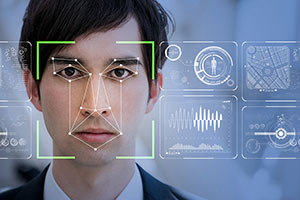
Facial recognition technology is being scrutinized and scorned by the members of the City of Somerville City council as an unwelcome addition to the community.
By Jim Clark
A proposed ordinance was put forward for consideration at the latest regular meeting of the Somerville City Council that would ban the use of facial recognition technology in the city.
While speaking in favor of the ordinance, Ward 3 Councilor Ben Ewen-Campen asked those present at the meeting, “Does anyone in Somerville think that it would be a good idea to pass a new law that would require everyone who lives here – any visitor passing through Somerville – to wear a permanent identification badge on their chest any time they go out in public? Walking your kids to school, going to Market Basket, HONKfest? And in addition to that, the information from all these identification badges would be going to a central database that is not really regulated, we don’t exactly understand who has control over it or under what circumstances they can access it. And also, these badges are not particularly accurate. There’s like a high false positive rate and there are racial biases in them. They’re more likely to misidentify women of color than white men. I don’t think that would be a popular law for Somerville to pass, and that is exactly what facial recognition technology is.”
Ewen-Campen went on to explain that the technology would allow the government to essentially track the identity of every person at any time with no transparent regulations or guardrails.
“Research has shown that existing technologies are not particularly accurate,” Ewen-Campen said. “And in particular, are far less accurate with people with darker skin, and in particular women with darker skin.”
Ewen-Campen mentioned the ACLU’s facial recognition survey on the current House of Representatives using an algorithm that is actively being marketed by Amazon to law enforcement agencies. In the survey, the faces of members of Congress were mapped to a database of mugshots of people who have been accused of crimes, and 28 members of Congress were subsequently misidentified by the technology used. In fact, the errors were over-represented for people of color.
Ewen-Campen stated that he has been working on an overall policy to regulate surveillance technology with the Mayor’s Office, the Police Department, and with the City Council, and that he looks forward to continuing that work. “But I really believe that facial recognition technology is in a class by itself and that the only thing that is appropriate to do at this time is to ban it altogether for usage by the City of Somerville and any of our agencies,” he said.
The ordinance submitted was drafted in consultation with the ACLU, and Emiliano Falcon, who represents that organization as its the Technology and Civil Liberties Policy Counsel, was sponsored by Ewen-Campen to address the Council. Falcon stated in part:
“I am here to support the Ordinance introduced by Councilor Ewen-Campen. This Ordinance provides for a ban on the use of face surveillance by Somerville’s government.”
“Face surveillance is technology that allows the Government to identify, track, and catalogue people based on the unique physical characteristics of their faces. This software works by creating a unique “faceprint” of individuals based on pre-identified photos or set of photos. These ‘faceprints’ are collected and included in a database. This database is then used to search for matches and identify new and unknown faces captured by public video cameras or similar surveillance devices. Some companies are also selling so-called ’emotion detection’ facial surveillance systems, which they claim can determine whether someone is happy, sad, honest, or deceitful.”
Falcon identified three primary areas of concern regarding these technologies: the unregulated use of the technology, its intrinsic dangers, and civil rights and civil liberties.
“Today, Somerville has a unique opportunity,” Falcon said. “Your city can become the first in the country to pump the brakes on the spread of this dangerous technology. The Ordinance presented by Councilor Ewen-Campen will protect the people of Somerville and free and open society in three key ways.”
It was announced on Tuesday – days after this Council meeting – that the city of San Francisco passed its own ban on the technology.
The proposed ordinance was referred to the Council’s Legislative Matters Committee and the City Solicitor’s office for further review and recommendations.















I may not care for it but finding criminals before they commit another crime would be a blessing. Why would anyone want to stop it?
Seriously? The entire article describes why we should want to stop it and what you walk away with is “Uhhhh…but if it stops criminals…”
???
And we wonder why the country is in the state it’s in.
You would basically have to stop police from filming or photographing anyone, ever, for this to really be true.
Any photo can be sent to the state police and run against your RMV photo.
Once any image is uploaded it can be run through Google or Facebook to find matches.
Not using facial rec as an upfront screening method does nothing to prevent use on the back end. Which is even less regulated.
If you have a state issued ID, you have already been subject to facial rec and it is already being shared with other law enforcement agencies.
Mmmmm…no. Different thing altogether, and you know it. Way too invasive, Big Brother stuff. They’ll never get it here as long as we have responsible officials like these looking out for us.
Since Ewen-Campen just had to turn the discussion into an identity politics conversation, like most self-proclaimed “progressives” do, I support the technology.
And at best, second in the country. SF already passed one.
Why I love people who say we need laws more like England’s.
Fined for protesting having image taken by facial recognition system.
https://www.independent.co.uk/news/uk/crime/facial-recognition-cameras-technology-london-trial-met-police-face-cover-man-fined-a8756936.html?utm_source=reddit.com
“identity politics”? If I didn’t know you were actually serious I’d say that’s a pretty good pun. Since you clearly are serious, it means you’re the joke. Hilarity ensues.
Leave it to the Republitards to get every and anything you wave at them completely ass-backwards wrong. No wonder indeed.
Oh Hell no. This thing will be nothing but trouble. Not here baby.
https://www.popularmechanics.com/technology/security/a27493840/police-abusing-facial-recognition-tech/